How Was Astrology Used In Ancient Times?
Step back in time and journey to the ancient world, where the celestial dance of the stars held profound significance in the lives of people. Brace yourself for a captivating exploration of how astrology was used in ancient times.
Prepare to unravel the mysteries of the cosmos and delve into the ways in which our ancestors harnessed the power of the heavens to navigate their lives. From Babylon to Egypt, Greece to China, astrology played a pivotal role in shaping the beliefs, decisions, and destinies of individuals and civilizations alike.
Discover how the planets and zodiac signs influenced everything from daily rituals to political decisions. Unearth the profound connections between astrology and religion, as the celestial movements were viewed as divine messages from the gods.
Through ancient tools and techniques, our forebearers sought to decipher the cosmic messages and gain insights into their past, present, and future. As we embark on this journey, prepare to witness the enduring legacy of astrology and its modern interpretations that continue to shape our lives today.
Key Takeaways
– Astrology in ancient times was used to create personalized horoscopes based on birth charts, providing insights into an individual’s character, strengths, weaknesses, and love matches.
– Zodiac signs were used to assess compatibility between individuals, helping to shape relationships and determine the best time for marriage.
– Astrology played a role in predicting the success of relationships and resolving conflicts, as well as understanding the impact of planetary alignments on agriculture and natural disasters.
– Astrology was deeply connected to ancient religious practices, allowing for communication with gods, insight into fate and destiny, and influencing daily rituals and important life events.
The Origins of Astrology
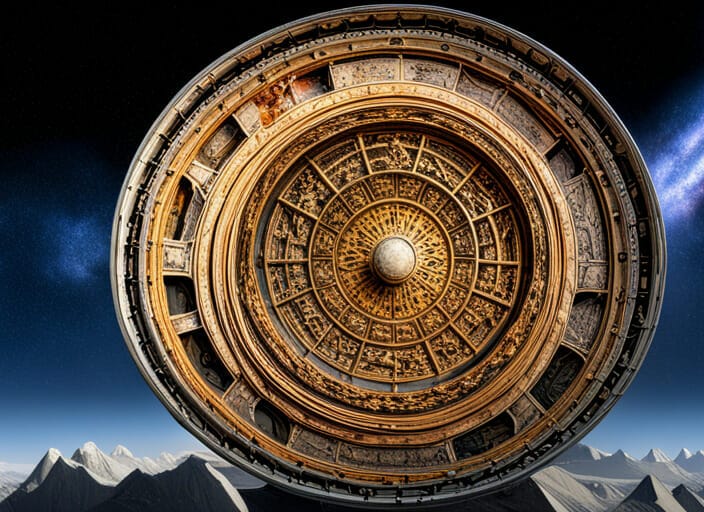
Astrology, with its ancient origins, captivates the imagination and stirs curiosity about how it was used in ancient times. The origins of astrology can be traced back to the ancient practices of the Babylonians and Egyptians.
These civilizations observed the movements of celestial bodies and believed that they held significant influence over human affairs. They developed intricate systems to interpret these movements and predict future events. For example, the Babylonians created the zodiac, a twelve-fold division of the sky, which played a crucial role in astrological calculations. Similarly, the Egyptians associated certain gods with specific celestial bodies, linking their influence to various aspects of life.
Astrology was deeply ingrained in the daily lives of these ancient societies, shaping decisions regarding agriculture, medicine, and even political affairs. Understanding astrology’s role in daily life provides valuable insights into the mindset and beliefs of our ancient ancestors.
Transitioning into the subsequent section, astrology’s impact extended far beyond mere entertainment or curiosity.
Astrology’s Role in Daily Life
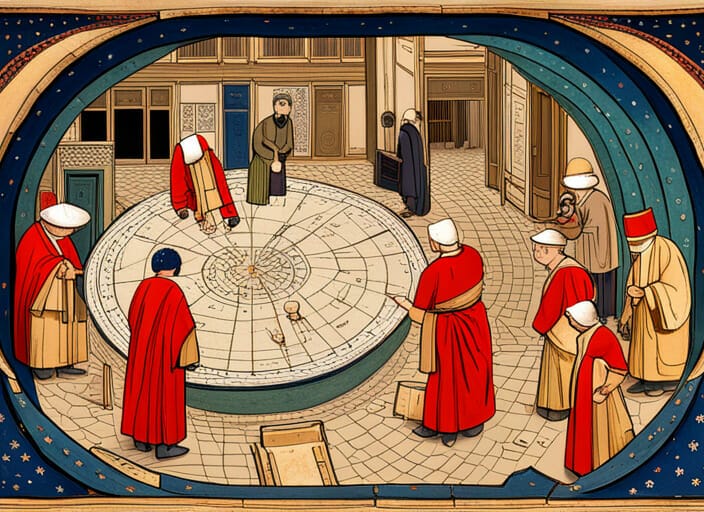
In astrology, predicting the future plays a significant role in daily life. By studying the positions and movements of celestial bodies, astrologers believe they can foresee events and outcomes.
Additionally, astrology is used to determine personality traits based on one’s birth chart, which is a map of where the planets were at the time of their birth. This information can provide insights into a person’s behavior, strengths, and weaknesses.
Lastly, astrology is often consulted to guide important decisions, such as career choices or relationships, as individuals believe that aligning their actions with the planetary influences can lead to favorable outcomes.
Predicting the Future
Unlock the secrets of tomorrow with the celestial roadmap etched in the stars. Astrology in ancient times was not only used to understand one’s present circumstances but also to predict the future. People believed that by studying the movements and positions of celestial bodies, they could gain insights into what lay ahead.
To make accurate future predictions, ancient astrologers used various divination techniques. These included observing the patterns of the stars, interpreting omens, and studying the alignment of planets. They believed that these celestial events could reveal information about upcoming events, such as wars, natural disasters, or even personal fortunes.
In addition to these techniques, astrologers also relied on dream interpretation and the use of oracles to gain further insight into the future. These practices were highly respected and sought after by individuals and rulers alike.
By understanding the future, people hoped to better navigate their lives and make informed decisions. Now, let’s delve into how astrology was used to determine personality traits in ancient times.
Determining Personality Traits
Through the celestial roadmap etched in the stars, ancient civilizations unraveled the mysteries of human personality, discovering hidden traits and qualities that shaped individuals’ lives. Astrologers interpreted birth charts, which were like personalized snapshots of the heavens at the moment of a person’s birth. By analyzing celestial movements and the positions of planets, they believed they could gain insights into an individual’s character and destiny. These birth charts were complex diagrams that included the positions of the sun, moon, and planets at the time of birth. They provided a detailed snapshot of the cosmic energies influencing a person’s life. By studying these charts, astrologers could determine a person’s strengths, weaknesses, and tendencies, helping individuals better understand themselves and make more informed decisions. Transitioning into the next section, astrology also played a crucial role in guiding important decisions.
Guiding Important Decisions
Navigate your path and make significant choices by harnessing the profound wisdom derived from deciphering the celestial roadmap.
In ancient times, astrology played a crucial role in guiding important decisions. Its cultural impact was immense, as it influenced various aspects of society, such as politics, agriculture, and even personal relationships. People believed that the positions and movements of celestial bodies had a direct impact on human affairs, and they used astrology as a tool to gain insight into the future and make informed choices.
While modern science may dismiss astrology as pseudoscience, its historical accuracy cannot be denied. Ancient civilizations carefully observed the stars and planets, developing intricate systems to interpret their meanings. By understanding astrology’s historical significance, we can better appreciate the influence of planets and zodiac signs on our lives.
Transitioning into the next section, let’s explore how these celestial entities shape our personalities.
The Influence of Planets and Zodiac Signs
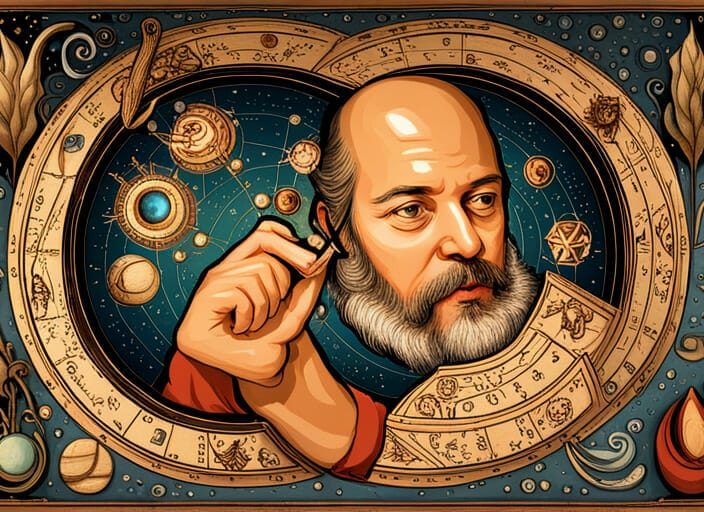
In understanding the influence of planets and zodiac signs, it’s important to recognize the significance of the Sun and Moon in astrology. The Sun represents our core identity and purpose, while the Moon reflects our emotions and instinctual nature.
Additionally, the zodiac signs play a crucial role in astrology as they provide a framework for understanding different personality traits and characteristics.
Lastly, planetary alignments hold deep meaning as they can indicate powerful energies and opportunities for growth or challenges in different areas of life.
By exploring these key points, you can gain a deeper understanding of how astrology impacts daily life.
The Sun and Moon’s Significance
In ancient times, astrologers saw the Sun and Moon as powerful celestial beings that held great significance in the art of astrology. The Sun symbolized vitality, leadership, and the essence of one’s true self. It influenced one’s personality, ego, and overall sense of identity.
The Moon, on the other hand, represented emotions, intuition, and the subconscious mind. Its phases were thought to affect moods, desires, and instincts.
Astrologers believed that the Sun and Moon’s positions at the time of a person’s birth could reveal important aspects of their character and life path. Understanding the symbolism and impact of these celestial bodies was crucial in interpreting an individual’s astrological chart.
Now, let’s delve into the role of the zodiac signs and how they further shaped ancient astrology.
The Role of the Zodiac Signs
The zodiac signs played a crucial role in shaping the ancient understanding of celestial influences. Astrologers believed that the position of the stars and planets at the time of a person’s birth determined their personality traits and future destiny.
Here are three fascinating ways in which the zodiac signs and horoscopes were utilized in ancient times:
1. Personalized predictions: Ancient astrologers would create individual horoscopes based on a person’s birth chart, which consisted of the positions of the planets in relation to the zodiac signs. These horoscopes would provide insights into an individual’s character, strengths, weaknesses, and even potential love matches.
2. Compatibility assessments: The zodiac signs were also used to determine the compatibility between individuals. Astrologers believed that certain signs were more compatible with each other, while others clashed. This information was used to guide decisions regarding partnerships, marriages, and friendships.
3. Astrology and relationships: In ancient times, astrology played a significant role in shaping relationships. People would consult astrologers to determine the best time for marriage, to predict the success of a relationship, and even to resolve conflicts between partners.
Understanding the role of the zodiac signs and horoscopes in ancient astrology provides a foundation for comprehending the significance of planetary alignments and their meaning in the subsequent section.
Planetary Alignments and their Meaning
In the previous section, we explored the role of the Zodiac signs in astrology. Now, let’s delve into another fascinating aspect of ancient astrology: planetary alignments and their meaning. Planetary alignments were believed to have a significant impact on various aspects of life, including agriculture and natural disasters. Ancient astrologers noted that certain alignments of planets could affect the growth of crops and the abundance of harvests. They also believed that specific alignments could trigger natural disasters such as earthquakes or floods. While modern science has debunked these claims, it is interesting to see how ancient societies perceived the connection between celestial bodies and earthly events. Understanding these beliefs allows us to gain insights into the mindset of ancient civilizations and how they perceived the world around them. Moving forward, let’s explore the role of astrology in religion.
Astrology and Religion

Astrology played a significant role in ancient religious practices, providing individuals with a personal connection to the divine and a deeper understanding of their place within the universe. The belief in astrology and its correlation with spirituality was prevalent in many ancient cultures, including the Egyptians, Greeks, and Hindus.
Astrology was seen as a way to communicate with the gods and gain insight into one’s fate and destiny. It was also intertwined with cultural practices, influencing everything from daily rituals to important life events such as birth, marriage, and death.
The alignment of celestial bodies was believed to hold symbolic meaning and was used to interpret omens, predict future events, and guide decision-making. By understanding the patterns and movements of the stars, ancient civilizations sought to navigate their lives in harmony with the cosmos.
Transitioning into the next section, astrological tools and techniques were developed to further explore these celestial connections.
Astrological Tools and Techniques
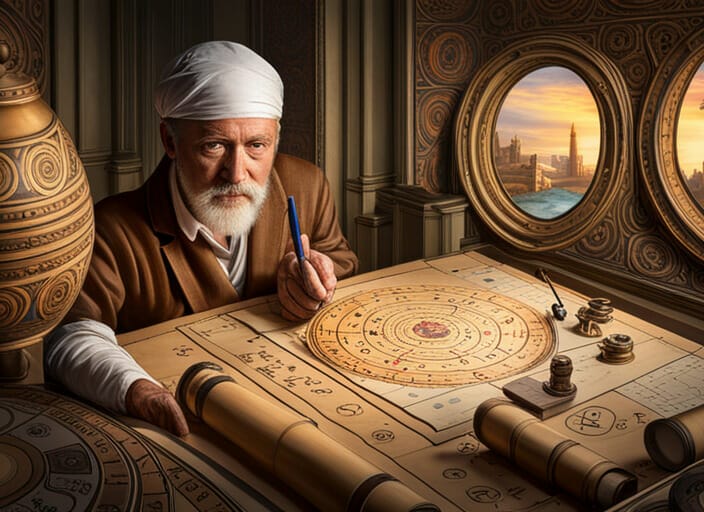
Throughout history, humans have crafted intricate instruments and refined techniques to delve into the celestial realm, unlocking the secrets of the cosmos and unveiling the interconnectedness of the universe. Ancient astrologers used a variety of tools and techniques to make astrological calculations and interpretations. Here are five examples of these astrological tools and techniques:
– Astrolabes: Used to measure the positions of celestial bodies and calculate their influence on human affairs.
– Ephemerides: Tables that provided the daily positions of the planets and other celestial objects.
– Zodiacs: Divided the sky into twelve sections, each associated with a specific constellation, to determine the position of celestial bodies.
– Horoscopes: Created by casting a birth chart based on the precise time and location of an individual’s birth to predict their future.
– Ancient astrological texts: Provided guidance on interpreting celestial events and their impact on human lives.
These tools and techniques were instrumental in ancient astrology, paving the way for its legacy and modern interpretations.
Legacy and Modern Interpretations
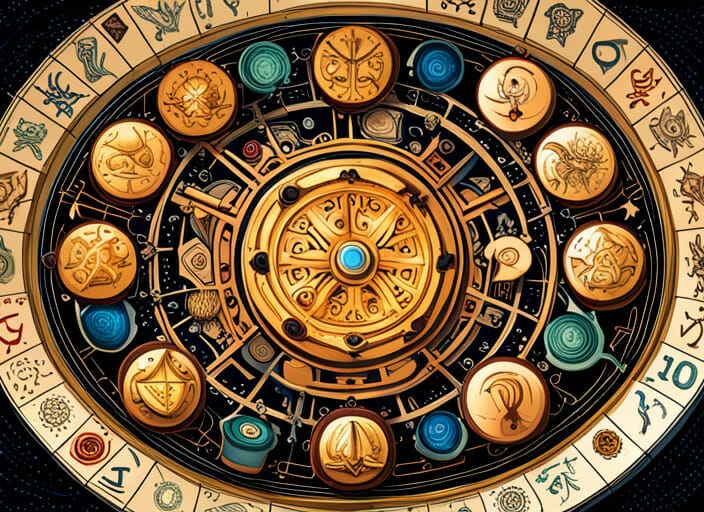
Now that you understand how ancient astrologers used various tools and techniques to study the stars, let’s explore the legacy and modern interpretations of astrology. In the modern world, astrology has evolved into a complex system of symbolism and interpretation. Astrologers today use a combination of ancient wisdom and contemporary understanding to analyze the positions of celestial bodies and their influence on human lives.
To help you grasp the depth of modern interpretations, let’s examine a table that illustrates the astrological symbolism associated with the planets:
| Planet | Symbolism |
|---|---|
| Sun | Vitality, self-expression, creativity |
| Moon | Emotions, intuition, nurturing |
| Mercury | Communication, intellect, adaptability |
| Venus | Love, beauty, harmony |
| Mars | Energy, action, passion |
| Jupiter | Expansion, growth, abundance |
| Saturn | Discipline, responsibility, structure |
| Uranus | Innovation, rebellion, independence |
| Neptune | Imagination, spirituality, illusion |
| Pluto | Transformation, power, regeneration |
By understanding these modern interpretations, astrologers can provide valuable insights into personal and collective experiences, helping individuals navigate their lives with a deeper understanding of themselves and the world around them.
Frequently Asked Questions
What are the main differences between ancient astrology and modern astrology?
The main differences between ancient and modern astrology lie in their relevance to political and social structures. Ancient astrology played a significant role in decision-making, while modern astrology is more focused on self-discovery and personal growth.
How did ancient civilizations view astrology compared to other forms of divination?
Ancient civilizations viewed astrology as a powerful and respected form of divination, placing it on par with other methods. It held great significance in political and social structures, guiding decisions and providing insight into the future.
Were there any specific rituals or ceremonies associated with astrology in ancient times?
Specific rituals and ceremonial practices were an integral part of ancient astrological traditions. Historical astrological ceremonies included offerings to deities, casting horoscopes, and performing divination rituals to interpret celestial signs for individuals and societies.
Did astrology have any significant impact on ancient political or social structures?
Astrology had a significant impact on ancient political and social structures. It influenced rulers’ decision-making processes and shaped their policies. Society as a whole relied on astrology for guidance and believed in its power to predict the future.
How did astrology evolve and spread throughout different regions of the ancient world?
Astrology evolved and spread throughout the ancient world due to cross-cultural influences. It was influenced by Mesopotamian, Egyptian, Greek, and Indian cultures, who exchanged ideas and practices, leading to the development and spread of astrological knowledge and techniques.
Conclusion
In conclusion, astrology played a significant role in ancient times, shaping daily life, religion, and decision-making. The alignment of planets and interpretation of zodiac signs offered guidance and insight into one’s fate.
Just like the stars guided ancient civilizations, astrology continues to captivate and influence people today. It is a timeless practice that has endured through centuries, much like a lighthouse guiding ships through treacherous waters.
So, let the light of astrology illuminate your path and navigate you towards a deeper understanding of yourself and the world around you.






